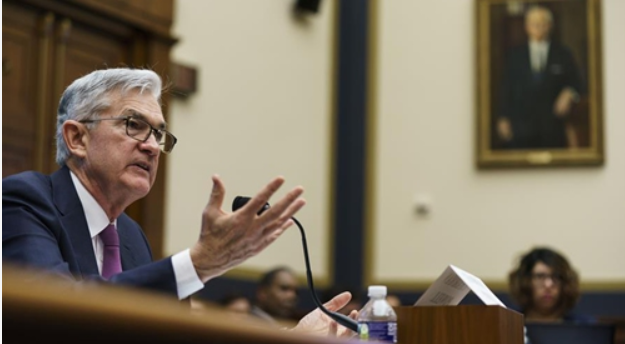
US Federal Reserve Chairman Jerome Powell testifies before the House Financial Services Committee during the Monetary Policy and the State of the Economy hearing on Capitol Hill in Washington DC, the US, on February 11, 2020. (Photo: Xinhua)
Thanks to China's impressive efforts to contain the spread of the novel coronavirus (COVID-19) at home, the country's financial markets are expected to become a safe haven for global investors as more central banks across the world are cutting interest rates to shield their economies from the viral impact.
The US Federal Reserve cut interest rates to 1.25 percent by 50 basis points - first such cut since December 2008 during the global financial crisis. The latest move followed three interest rate cuts in 2019 for a total of 75 basis points.
The move comes as "the coronavirus poses evolving risks to economic activity" and is devised in support of achieving the US' maximum employment and price stability goals, the Fed said in a statement.
However, despite the sizeable cut, all three major US stock indexes dropped nearly 3 percent at closing time on Tuesday, and the 10-year US Treasury note yield declined to below 1 percent for the first time since the global financial crisis.
While offering economic stimulus, the Fed's move also verified the serious implications of the viral epidemic on the global economy, as fueling risk aversion sent US shares and the dollar lower, Ming Ming, chief macro and fixed-income analyst at CITIC Securities, said in a note sent to the Global Times on Wednesday.
The COVID-19 has now spread to more than 70 countries and regions, with over 12,000 infections reported outside China, appearing in Asia, Europe, Middle East and North America.
"Compared with the rapid spread outside China, the epidemic has increasingly been under control domestically. As a result global liquidity released by the Fed's move will benefit China's financial markets, especially in bonds," Ming said.
Yang Delong, chief economist at the Shenzhen-based First Seafront Fund Management Co, said a bigger China-US interest rate divergence will see more global capital flowing into China and boosting the yuan.
In the wake of the US Fed's rash announcement, the onshore and offshore yuan both rallied to above 6.94 yuan against the US dollar on Wednesday.
Meanwhile, Chinese stocks have been able to awaken from an earlier slumber and rise up against the pressure of plunging global stock markets as the coronavirus jolted investors around the world.
Since February 3 - the first trading day after the Spring Festival holidays amid the outbreak - the Shanghai stock exchange has climbed nearly 10 percent, while the Shenzhen market has rallied by over 17 percent.
The benchmark Shanghai Composite Index edged up by 0.63 percent on Wednesday, while the Shenzhen Component Index was up by 0.08 percent, led by engineering design and dye stocks.
"The A-share market is expected to become a haven for global hedge funds, as the US markets have started to drop from the climax of a 10-year bullish trajectory and may continue falling this year," said Dong Dengxin, director of the Finance and Securities Institute at the Wuhan University of Science and Technology. He predicted US markets may drop at least 10,000 points this year.
Lower-interest-rate tide
Fears over the worsening coronavirus crisis will drive a new tide of interest rate cuts across the globe, as many struggle to contain the economic fallout from the virus, analysts said.
On Tuesday, the Australian Reserve Bank slashed its interest rates by 25 basis points to a record low of just 0.5 percent. On the same day, the Malaysian central bank cut the same amount to lower its overnight policy rate to 2.5 percent.
Macao followed on Wednesday by lowering its base rate to 1.5 percent by cutting 50 basis points.
However, analysts have differing opinions over whether China will join in the wave of global interest rate cuts. Dong said China will unlikely follow these countries' steps in part because China's monetary policies are independent and consistent, and therefore won't be swayed easily by external factors.
But with measures including lowering reverse repo rates and medium-term lending facilities already in place, there is a possibility that the People's Bank of China may further cut benchmark interest rates by 25 basis points in March to help coronavirus-hit businesses in the country, Yang predicted.
Hua Changchun, chief economist at Guotai Junan Securities, told the Global Times in a previous interview that China's economy will see a rapid V-shaped rebound after the epidemic sees an end with the year-round GDP growth rate reaching 5.8 percent.
Dong said China's policy toolkit has abundant measures other than interest rate cuts to cope with the economic impact of the virus, such as cutting fees and reserve requirement ratios, with the country continuing to lead global growth.


